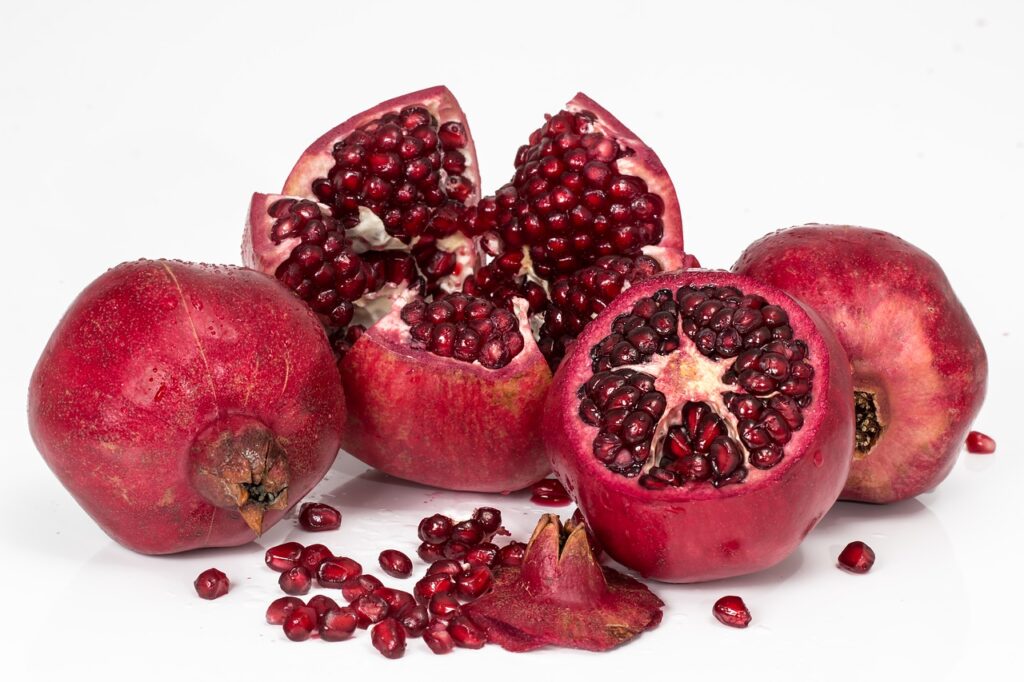What Are Pomegranates?

Pomegranates (Punica granatum) are one of the healthiest fruits and are best known for the jewel-like arils stored inside their red leathery rind. Pomegranates have a light-red leathery skin and a floral crown (or calyx) at the top. The pomegranate is classified as a berry and the fruit is unique as it is filled with juicy ruby-red arils (or seed sacs) separated by thin white membranes.
As well as being eaten as a regular fruit the arils can be sprinkled on cooked meats, added to marinades, sauces and salsas to create new flavours. The health benefits of pomegranates are profound and are mainly due to its high levels of potent anti-oxidants.
Nutritional Content
The health benefits of pomegranates are due to the high levels of vitamins, minerals and phytonutrients which they contain.
100g of pomegranate contains:
- Calories: 83
- Fibre: 83
- Protein: 1.67g
- Sugar: 13.67g
- Vitamin C: 10.2mg
- Vitamin K: 16.4μg
- Calcium: 10mg
Pomegranates are a great source of vitamin C and K. They are also packed with minerals including copper, potassium, folate, thiamine, vitamin B6 and calcium. In addition, they contain high levels of phytochemical antioxidants such as the polyphenols and punicalagins.
Health Benefits of Pomegranates
The health benefits of pomegranates include the following:
1. Powerful Antioxidant and Anti-Inflammatory Effects
Pomegranates contain high levels of antioxidants which are very beneficial for health. They neutralise harmful free radicals which can cause oxidative stress leading to cell damage. Free radical damage is involved in the early stages of atherosclerosis. as well as cancer, vision loss and a range of other chronic conditions.
The vast majority of the health benefits of pomegranates are due to the high levels of antioxidants. The combination of potent antioxidants is so powerful that pomegranate has three times the antioxidant activity of red wine and green tea.
The main antioxidants found in pomegranate include:
- polyphenols such as the tannins, anthocyanins and ellagic acid.
- Punicic acid which is the main fatty acid found in the arils. It’s a conjugated linoleic acid found in pomegranate seed oil which has powerful health benefits.
- Punicalagins. These very potent antioxidants are found in pomegranate juice and peel and have a strong anti-inflammatory effect. They are very effective in reducing chronic inflammation which may lead to chronic diseases such as heart disease, cancer, type 2 diabetes and Alzheimer’s disease.
A 3 month study in diabetics found that 250ml of pomegranate juice daily reduced the inflammatory markers CRP and interleukin-6 by 32% and 30%, respectively.
Punicalagin has a high concentration in the peel and so pomegranate extract and powder is usually made from the peel.
2. May Help Fight and Prevent Some Types of Cancer
Studies show that pomegranates may prevent certain types of cancer and may even fight cancer. The anti-inflammatory properties and rich polyphenol content prevent DNA mutations, inhibit cancer cell growth, and help prevent cancer from spreading. More studies are needed, but research shows that pomegranates can help combat prostate, breast, colon, and lung cancer.
Various studies have also shown that the high levels of antioxidants in pomegranates may help inhibit cell proliferation. They may also promote cell death in various cancer cells, especially in prostate cancer.
In addition, studies have shown that drinking 250ml pomegranate juice daily may reduce the rate of increase of prostate specific antigen (PSA). This is a blood marker for prostate cancer where a high PSA level is associated with a higher risk of prostate cancer.
Pomegranate has shown very promising results in the prevention and treatment of various types of cancer but more research is required.
3. May Help Lower the Risk of Cardiovascular Disease
High blood pressure is one of the main risk factors for cardiovascular disease such as heart attacks and strokes. A 2017 study showed that drinking 60ml of pomegranate juice daily reduced blood pressure, improved cholesterol levels and removed plaque from arteries. Pomegranates should therefore be included in a healthy balanced diet.
As well as helping to lower blood pressure, the powerful antioxidants in pomegranates also help improve the cholesterol profile in the blood. In addition, they prevent the oxidation of LDL cholesterol which leads to the hardening and narrowing of the coronary arteries.
A 4-week study found that when 800mg of pomegranate seed oil was given daily to 51 people with high triglyceride levels, a significant reduction of triglycerides was seen together with an improved triglyceride-HDL ratio.
Other studies have shown significant reductions in ΄bad΄ LDL cholesterol when pomegranate juice is given to type 2 diabetics with high cholesterol levels.
4. May Help Reduce Arthritis and Joint Pain
Due to its powerful anti-inflammatory properties, pomegranates can reduce joint tenderness, swelling, and pain. Various studies have shown that pomegranate extract may block the production of enzymes that worsen arthritis by attacking cartilage. Though human studies are limited, initial studies show that pomegranate may be beneficial in relieving the symptoms of arthritis.
5. May Help Prevent Erectile Dysfunction
Pomegranate Juice has been found to have beneficial effects on erectile dysfunction, a disorder that affects 1 in 10 men worldwide. It can be caused by several factors, including arterial plaque, high blood pressure, heart disease, diabetes, nerve damage, endocrine imbalance or depression. Ultimately, erectile dysfunction is a condition that affects the blood flow to the penis during sexual stimulation.
Oxidative damage can impair blood flow in all areas of the body, including erectile tissue. The powerful antioxidant phytochemicals in pomegranates help to prevent oxidative stress and so may be beneficial in preventing erectile dysfunction.
Studies have shown that pomegranate juice increases endothelial nitric oxide levels and directly affects atherosclerotic changes associated with erectile dysfunction. Nitric oxide is a potent vasodilator which improves blood flow. Pomegranate juice contains potent polyphenolic flavonoid antioxidants known as anthocyanins. Studies show that pomegranate juice has more polyphenol antioxidants than any other fruit juice tested for antioxidant activity. It has also been shown to have greater antioxidant activity than green tea or red wine.
A randomised-controlled trial involving 53 men with mild to moderate erectile dysfunction found that 42 of the men reported improvement after drinking pomegranate juice daily over a two week period. Further studies are required as this pilot study suggests the possibility that larger studies and longer treatment periods may achieve statistically significant results.
6. May Help Improve Memory
Pomegranate juice is rich in polyphenols, which have been found to improve memory function. Studies have shown that individuals drinking pomegranate juice daily performed better in memory tests compared to those who drank a placebo drink.
A study involving 28 elderly adults with memory complaints found that 250ml of pomegranate juice daily significantly improved markers of verbal and visual memory.
Further studies are required to analyse the possibility of pomegranates in preventing the development and progression of dementia, including Alzheimer’s disease.
7. May Improve Exercise Performance
Pomegranate is rich in dietary nitrates which have been shown to improve exercise performance.
A study involving 19 athletes running on a treadmill showed that 1g of pomegranate extract 30 minutes before exercise significantly enhanced blood flow thus delaying the onset of fatigue and increasing exercise efficiency. Though very promising, more studies are required.
8. May Improve Skin Health
Pomegranate juice can help replenish dry, dull skin. It is also a great source of vitamin C which is necessary for the production of collagen. Collagen is a protein which causes the skin to maintain its elasticity. When pomegranate is applied topically it can improve the skin’s texture and radiance. An example of a homemade pomegranate skin scrub as follows:
Use a blender or food processor to combine 3 tablespoons of pomegranate seeds, 1 cup of cooked oatmeal, 2 tablespoons of extra virgin organic olive oil and 1 tablespoon of raw honey. Apply to your face, leave it in place for about 10 minutes, then rinse with warm water.
In addition, pomegranates may help to prevent acne. The powerful antioxidants help to fight acne by reducing inflammation that can lead to breakouts.
Summary
Pomegranates are one of the healthiest fruits as they are loaded with nutrients and powerful phytochemicals. These powerful antioxidant phytochemicals may help reduce the risk of various chronic diseases, including heart disease, cancer, arthritis and other inflammatory conditions. In addition, pomegranates may boost your memory and exercise performance. Pomegranates should therefore be included as part of a healthy balanced diet.
